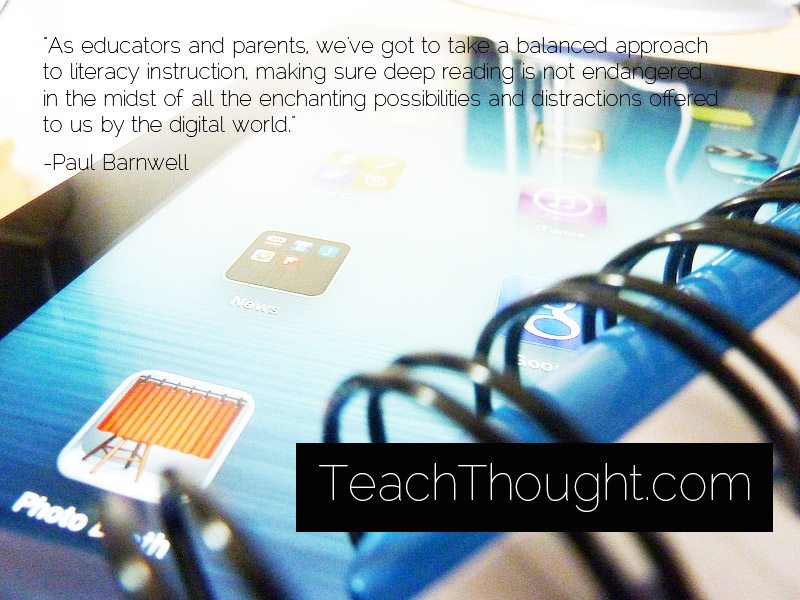The Jarring Collision Between Digital Screens And Close Reading
by Paul Barnwell, Teacher of English and Digital Media and blogger at mindfulstew
Over the years, the following writers have enchanted me: Stephen King, Larry McMurtry, Pat Conroy, Wendell Berry, Tim Winton, Silas House, Charles Frazier, Jonathan Tropper and, most recently, Carlos Ruiz Zafon, whose novel Shadow of the Wind has taken a spot on my all-time favorite novel list.
If I had been given an iPad as a toddler, or had a smart phone vibrating in my pocket through middle school, what are the chances I would have become what Annie Murphy Paul describes as an “endangered” deep reader, someone who is able to lose himself or herself in a text, activating memory, connections, all the while considering life’s big questions?
Paul’s essay Are Readers An Endangered Species? challenges us educators, parents, and others interested in the magic and benefit from sustained pleasure reading on the printed page to avoid solely meeting children in the digital age. “Observing young people’s attachment to digital devices, some progressive educators and permissive parents talk about needing to “meet kids where they are,” molding instruction around their onscreen habits.
This is mistaken.
Hyperlinking To Death
We need, rather, to show them someplace they’ve never been, a place only deep reading can take them,” she writes.
After all, as digital reading, hyperlinks, and Tweets can provide all of our text consumption without second thought–especially for the youth–somebody will have to model and show children how powerful it is to focus on long narratives on the printed page. Simply put, Paul contends that deep reading can enrich us as people more than digital reading and interaction.
On the other hand, digital literacy and screen-time enthusiasts such as Lisa Nielsen of The Innovative Educator argue that the amazing ways we can connect, consume, compose, and communicate online trump the power of deep, close reading on the printed page.
I agree with her assertion, to an extent. But I question how well young people can tap into the power of the digital world, making connections, composing blog posts, etc., without having a foundation in deep reading. What happens when educators and parents fall victim to an unbalanced approach to literacy, fully embracing all the possibilities of the digital world, bypassing deep, “old-school” reading?
As a teacher, I’d rather have a class full of deep readers than hoards of students hooked to their smart phones. Students who immerse themselves in narratives and novels generally bring a lot more to the table, so to speak. They often ask more questions, write more effectively, and display greater concentration skills. Yes, these are massive generalizations, but I’ve interacted with hundreds of students over the past nine years and Paul cites a study that supports my anecdotal observations:
“Last month, for example, Britain’s National Literacy Trust released the results of a study of 34,910 young people aged eight to sixteen. Researchers reported that 39% of children and teens read daily using electronic devices, but only 28% read printed materials every day. Those who read only onscreen were three times less likely to say they enjoy reading very much, and a third less likely to have a favorite book. The study also found that young people who read daily only onscreen were nearly two times less likely to be above-average readers than those who read daily in print or both in print and onscreen.
The Takeaway?
As educators and parents, we’ve got to take a balanced approach to literacy instruction, making sure deep reading is not endangered in the midst of all the enchanting possibilities and distractions offered to us by the digital world. While I have benefited personally and professionally due to my own engagement in the digital world, I still turn to books as greater influence in enriching my life, a sentiment reflected in the following passage from Shadow of the Wind:
“Never before had I felt trapped, seduced, and caught up in a story,’ Clara explained, ‘the way I did with that book. Until then, reading was just a duty, a sort of fine one had to pay teachers and tutors without quite knowing why. I had never known the pleasure of reading, of exploring the recesses of the soul, of letting myself be carried away by imagination, beauty, and the mystery of fiction and language. For me all those things were born with that novel. Have you ever kissed a girl, Daniel?’
My brain seized up; my saliva turned to sawdust.
‘Well, you’re still very young. But it’s that same feeling, that first-time spark that you never forget. This is the world of shadows, Daniel, and magic is a rare asset. That book taught me that by reading, I could live more intensely. It could give me back the sight I had lost. For that reason alone, a book that didn’t matter to anyone changed my life.”
Paul Barnwell teaches English, creative writing, and digital media at Fern Creek Traditional High School in Louisville, Ky. Thanks to the CE&S Foundation, he will complete a degree at Middlebury College’s Bread Loaf School of English in Oxford this summer. When not experimenting with urban gardening, bow-hunting, writing at his blog Mindful Stew, or watching football, he’s an active participant in the Bread Loaf Teacher Network, the National Writing Project, and the Center for Teaching Quality‘s Collaboratory; Image attribution flickr user storytellers



